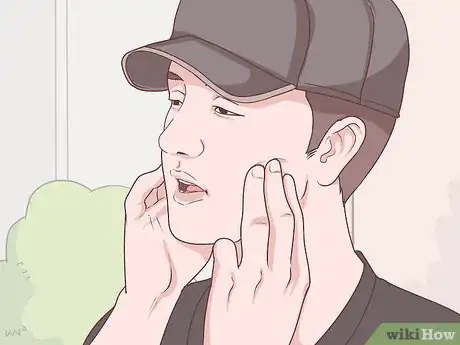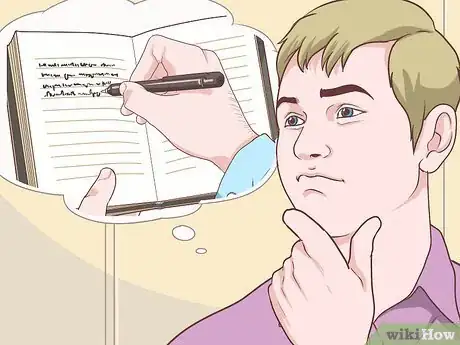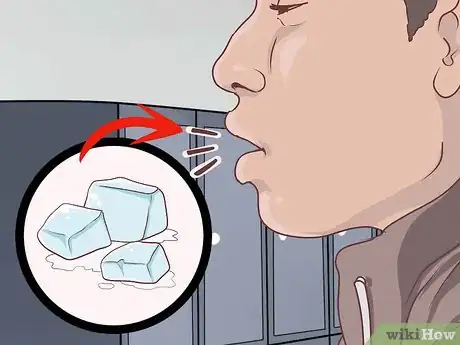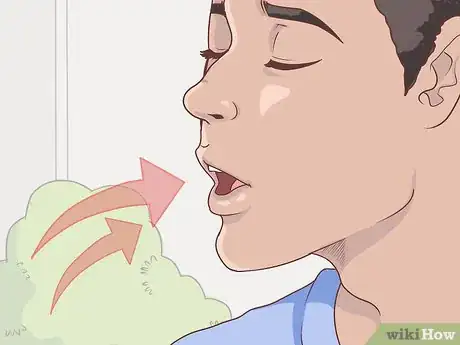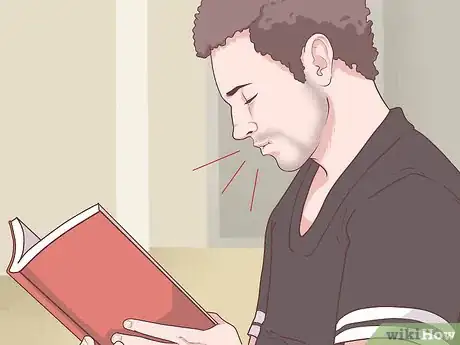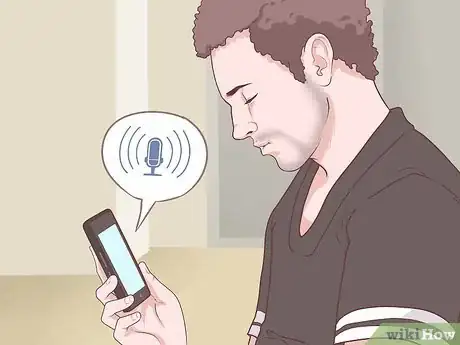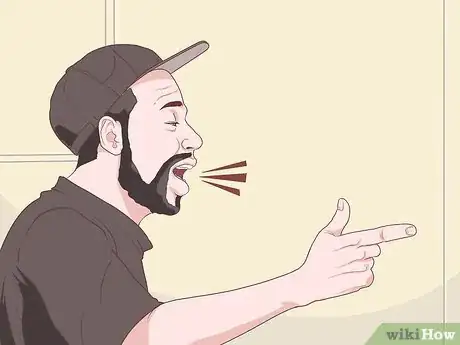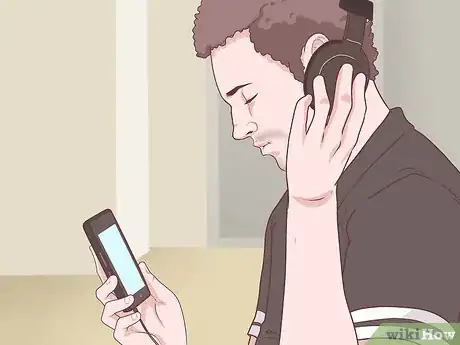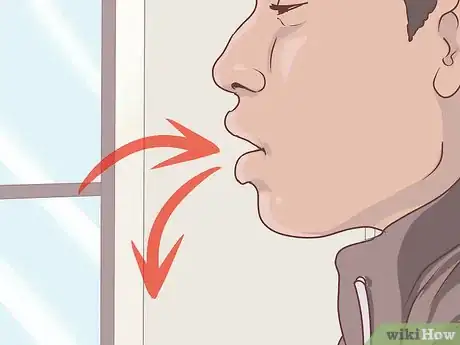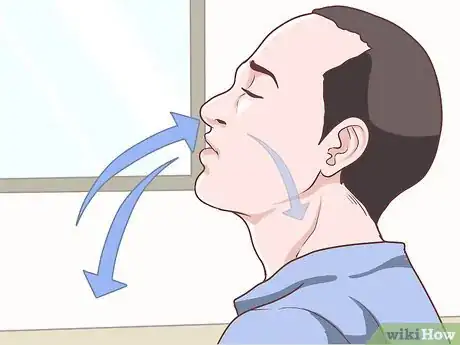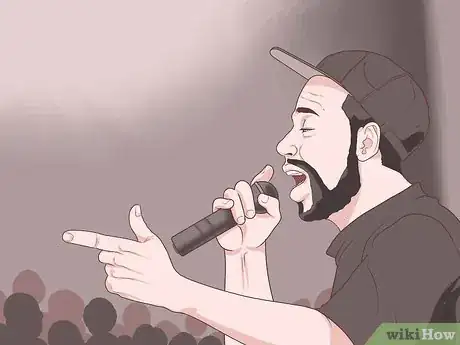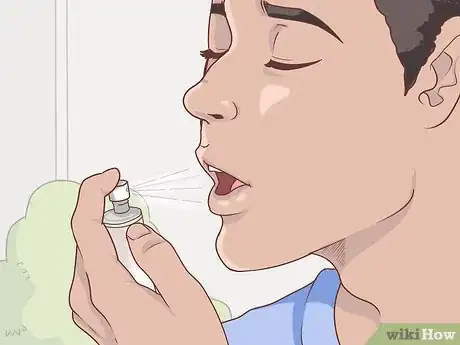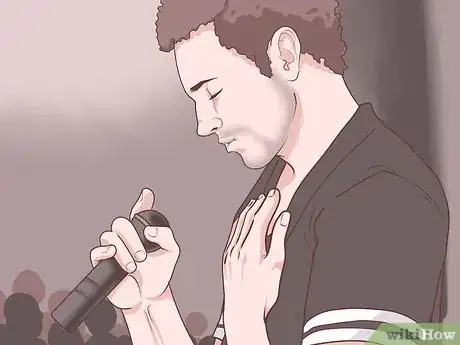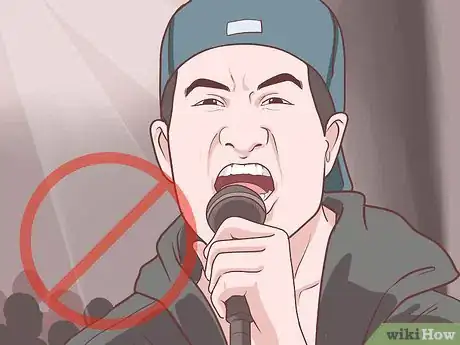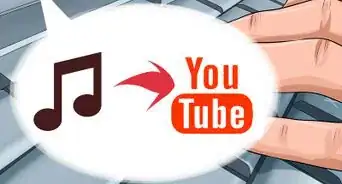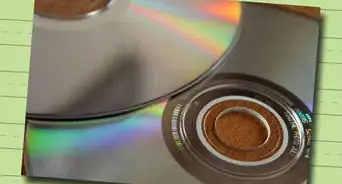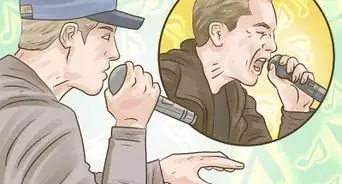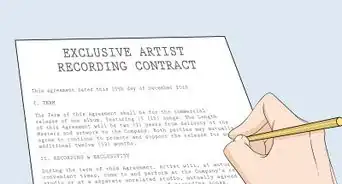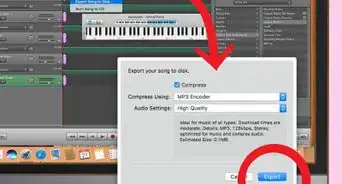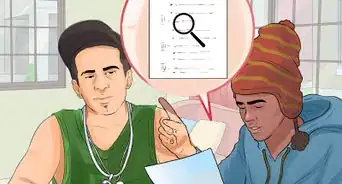This article was co-authored by wikiHow Staff. Our trained team of editors and researchers validate articles for accuracy and comprehensiveness. wikiHow's Content Management Team carefully monitors the work from our editorial staff to ensure that each article is backed by trusted research and meets our high quality standards.
There are 23 references cited in this article, which can be found at the bottom of the page.
wikiHow marks an article as reader-approved once it receives enough positive feedback. In this case, 81% of readers who voted found the article helpful, earning it our reader-approved status.
This article has been viewed 214,351 times.
Learn more...
Rapping like a speed demon will leave your audience reelin', you'll finish your rhyme and hear them all screamin' and squealin', but learnin' how can leave you feelin', at a loss for what to do. Many rap legends are recognized for the ability to spit a rhyme in no time, and if you aspire to become a rap king from a lowly squire, you've got your work cut out for you! Train your skill, be brave and perform, protect your voice, and soon your speed will be well outside the norm.
Steps
Training Your Fast-Rap Style
-
1Warm up your voice before rapping. As a rapper, your instrument is your voice. If you don't warm up your instrument beforehand, you could hurt your voice or end up rapping less impressively than you want. Some ways you can warm up your voice include:
- Massaging your jaw to release tension. Tension in your jaw can have a negative effect on your tone. Take the heel of your hand and, starting below your cheekbone and moving toward your chin, rub with moderate pressure in small circles.
- Trilling with your lips. Vibrate your lips together with a "h" sound, like a horse nickering, to get your lip muscles ready to spit some sick lyrical rap. Repeat this exercise with a "b" sound, as though imitating a boat sound.
- Buzzing like a kazoo. Vibrate your lips together and ascend to the upper reaches of your vocal range in a controlled fashion. When you've reached your upper limit, kazoo down to your lower range in the same fashion. Repeat this several times.
-
2Write potential material ahead of time. Many rappers look at using pre-made material when freestyling as bad form. However, by writing down material in your free time, you'll train your mind to come up with rhymes on the fly more easily. Come up with lists of words that you find significant and interesting rhyme combinations. You might even want to carry a notebook and pen around with you to jot down ideas as they occur to you.
- Experiment with different kinds of rhymes. Traditionally, rhyme structure looks at the sounds shared between two words, but you could make use of near rhymes or rhyme one word with a two word compound. For example, the word "orange" forms a near rhyme with the compound "door hinge."[1]
- Use internal rhymes, like Edgar Allen Poe's classic poem, The Raven. To take an example of this from the beginning of The Raven, "Once upon a midnight dreary, while I pondered weak and weary..."
- Seek out rich rhymes. These are often overlooked due to the fact that although they sound similar, they are written differently. Some examples include the pairs: raise-raze, blew-blue, guest-guessed, and so on.[2] [3]
Advertisement -
3Practice your enunciation. Enunciation is how clearly you speak or pronounce words, and when rapping quickly, good enunciation is very important if you want people to understand the words you are saying. There are many ways you can practice enunciation. Many vocalists, actors, and TV personalities will warm up their mouths by saying tongue twisters.
- Another technique you can make use of to improve enunciation forces your mouth to speak clearly around an obstruction, like marbles, ice cubes, or a cork. In this exercise, you should hold a cork between your lips or a smaller object, like marbles or ice cubes, inside your mouth while speaking. Try to speak clearly around the object to train precision in speaking.
- You might find that your rapping (and speaking) abilities improve if you practice your enunciation at the start of every day. While getting your day started, say a few of your favorite tongue twisters to yourself.
- Try to add variety to your enunciation routine. You might alternate fast and slow speeds every other line, you might over pronounce and exaggerate each word, or you could try saying it in a whisper.[4] [5]
-
4Practice controlled breathing. Poor breathing technique could leave you gasping into the mic after spitting some righteous rhyme. This can distract listeners from your message or your clever use of words. You'll have better tone and support for your voice if you breathe from your diaphragm, which is a band of muscle below your lungs.
- When your diaphragm is engaged, it pulls down allowing your lungs to draw in air. When it pushes up, the air is forces from your lungs. You should feel the area between the bottom of your rib cage and your bellybutton extend outward slightly when breathing from your diaphragm correctly.[6]
-
5Read out loud. Reading out loud can help you speak more smoothly and will improve stuttering, stammering, and getting tongue tied. Reading out loud can also help you speak faster, which will translate to faster rapping ability.[7] Because of the fact that rap is a spoken form of music that still maintains rhythm, you should consider reading poetry out loud, as poetry often has strong rhythmic decisions, which also might help you gain a better sense for the flow of language.[8] [9]
- To improve your abilities and identify areas you could improve, you should read/recite poetry, speeches, or segments from books in front of others. This way you can get feedback on your delivery, rhythm, and also get encouragement about the things you did well.
-
6Record your voice on your computer or phone and listen to it. This is an important part of your improving your rap skills. When rapping, you might get caught up in the moment or in the flow of what you are saying, which might make it hard to identify trouble spots or strong points. You might find you struggle with a certain word, or a certain sound. If you know you have this problem, you can drill saying it so you don't make a mistake when you're rapping onstage.
-
7Find your message. You'll be more passionate if you're rapping about something important to you. This, in turn, will lead you to being more productive in your rapping.[12] You don't have to only rap about your message, whatever that may be. But you can tap into those strong feelings to rap about topics you don't care much about with a fire that listeners will recognize.
- Examine your values to help understand what your message is. What are the things most important to you? What do you hate and want to change? These questions will help guide you in finding out your message.
- Look through past raps you've written or reflect on freestyling you've done in the past. Do you notice any themes that occur over and over again? These might also indicate a message or theme that is important to you.
-
8Listen to and imitate rappers you want to be like. The styles of your favorite artists can act as a lens through which you focus and discover your own style. Repeating your favorite lyrics can help improve your diction. Writing your own rap that follows the same pattern of your favorite rappers, too, can help you produce material and hone your rap sense.[13]
Rapping Fast in Front of an Audience
-
1Stay calm. Tension can lead to you getting tongue tied or going blank. Take a few breaths, have a drink of water before you go on stage, and don't rush yourself. Even if you want to imitate your favorite blazing-fast rapper, everyone has to learn to walk before they run - that means you'll have to start slower and work your way up to a faster speed.
- Try to distract yourself from the people and the performance. Focus on your message, on what you are going to say, and on the importance and enjoyment you get from rapping. Use these positive things to overcome your nerves.
- You might benefit from moving around a bit on the stage, if you have a mic that'll allow you to do so. When you become nervous, it's natural to freeze up and feel like you're paralyzed. Fight that feeling by moving around, using gestures, and engaging your body.[14]
-
2Relax muscular tension. Muscular tension can cause your jaw to clench, which can make you harder to understand when rapping.[15] Muscle tension can also lead to trembling or discomfort, which could effect your stage presence. Mental relaxation techniques can help calm your body and release tension in your muscles.
- Progressive muscular relaxation is a 15 minute technique that could also help with pre-performance tension. First, moderately tense specific muscle groups, like your neck, shoulders, arms, and legs. After five seconds of tensing each muscle group, release the tension and exhale as you do.[16]
-
3Sustain your flow. Even professionals make mistakes sometimes when performing live. The trick is to not let that small mistake ruin the rest of your performance. Stopping immediately whenever you make a mistake and going back to the beginning will train your mind to unnaturally break phrases up. Instead, when you are practicing, finish the phrase and then go back and correct your error, speaking the whole phrase fluidly and without interruption. This will help you speak through mistakes made in live performances.[17]
- A hallmark of talented freestylers is making errors part of the rap. Rapper Eminem is an excellent example when he said, "I take a beat and loop it, / I take a beat and shoop it, / Shoop it? What does that mean? / I don’t know but I got fat jeans on, / And I already said that, / I don’t know where my head’s at..."[18]
-
4Perform regularly. Seek out local rap competitions. Participate in ciphers where two or more rappers trade off speaking verses.[19] Only by performing regularly can you develop your stage presence, slay the demon of stage fright, and become at home where you belong - on the stage.[20] Onstage performances will also help you train your ability to think quick on your feet in front of people.
- Try to walk into your first performances with the perspective that it will be a learning experience. No one expects to be a master of something on their first try, and in this same way, you shouldn't expect yourself to be perfect your first time on stage.
Protecting Your Instrument
-
1Drink warm, soothing liquids. Warm tea has long been a remedy for sore throats, but it can also help keep your voice from becoming strained in the short term or damaged in the long term. Liquids that are too hot can be bad for your throat, and drinking liquids that are too cold before performing can hurt your vocal.
- Poor hydration can lead to permanent damage in your vocal folds. If you plan on rapping professionally, you should take frequent water breaks to protect your voice.
- Licorice and peppermint teas are recommended for your voice. Peppermint tea will cut down on gnarly phlegm that give your voice a garbled tone, and licorice tea will numb and sooth your throat, which is excellent if you have to perform night after night.[21]
-
2Use vocal sprays to restore and preserve your voice. You should avoid sprays that numb your throat. These can lead to you pushing your voice too hard, which can result in permanent damage.[22] However there are some hydrating brands, like Entertainer's Secret and Vocalise, which should be available at your local drug store.[23] Keep one of these products handy and use it regularly when practicing and performing.
-
3Take frequent breaks when rapping. Your voice is just like any other muscle, and using it too much or pushing it too hard can lead to serious trouble. This could be something as simple as hoarseness or voice loss, which can usually be remedied by resting your voice until it returns to normal. But this can prevent you from going on stage, recording, or practicing!
- It's better to take a few short breaks than lose an entire day of practice/performing because you need to rest your voice. If you feel tightness, pain, or a change in your quality of voice, it's likely a sign that you need to take a break.[24]
-
4Use the mic to your advantage when able. Even when you're getting fired up and you really want to tear loose with your voice, you should avoid yelling or screaming. This can tire out your voice or even cause it damage.[25] Instead, use mic techniques to imitate yelling and screaming without doing harm to your voice.
-
5Avoid voice damaging substances. Smoking tobacco will cause damage to your vocal folds over time and drinking alcohol will dehydrate your vocal folds, making them more prone to damage and strain. Avoid food that causes heartburn. Over time, the stomach acid from causing your heartburn could also harm your voice.[26] [27]
Community Q&A
-
QuestionHow can I practice fast rapping?
 Community AnswerJust practice writing the lyrics and talking them as fast as you can, or read a book as fast as you can.
Community AnswerJust practice writing the lyrics and talking them as fast as you can, or read a book as fast as you can. -
QuestionHow can I write a rap song?
 Community AnswerSee this article for tips: how to write a rap song.
Community AnswerSee this article for tips: how to write a rap song. -
QuestionWhat if I get hungry?
 Community AnswerTry to wait until after your performance before eating your meal. Its better to eat after performing than before or during
Community AnswerTry to wait until after your performance before eating your meal. Its better to eat after performing than before or during
Warnings
- Over using your voice or straining it without proper rest and hydration can result in permanent damage.⧼thumbs_response⧽
References
- ↑ http://www.imdb.com/title/tt0134599/quotes
- ↑ http://www.dailywritingtips.com/types-of-rhyme/
- ↑ http://www.public.asu.edu/~aarios/formsofverse/furtherreading/page2.html
- ↑ http://www.nyee.edu/patient-care/otolaryngology/voice-swallowing/therapy/vocal-warm-ups
- ↑ https://www.successfulsinging.com/free-singing-guides/info-guides/about-singing/tongue-twisters-for-singers/
- ↑ http://breakingmuscle.com/cycling/how-to-activate-your-diaphragm-to-improve-breathing-and-performance
- ↑ http://www.mnsu.edu/comdis/kuster/Kehoe/FAQstuttering.html
- ↑ http://www.writing.upenn.edu/~afilreis/88/meter.html
- ↑ http://www.powerpoetry.org/actions/5-tips-spoken-word
- ↑ http://genetics.thetech.org/ask-a-geneticist/tone-deaf-genetics
- ↑ http://makingmusicmag.com/how-to-train-your-ear-for-perfect-pitch/
- ↑ http://www.saybrook.edu/rethinkingcomplexity/rc-posts/increase-productivity-through-passion-freedom/
- ↑ https://www.flocabulary.com/freestylerap/
- ↑ http://www.skillsyouneed.com/present/presentation-nerves.html
- ↑ http://www.innerhealthstudio.com/symptoms-of-anxiety.html
- ↑ http://www.anxietybc.com/sites/default/files/MuscleRelaxation.pdf
- ↑ http://www.creativitypost.com/psychology/8_things_top_practicers_do_differently
- ↑ https://www.flocabulary.com/freestylerap/
- ↑ http://gawker.com/231470/ghetto-pass-classic-the-cipher
- ↑ https://www.psychologytoday.com/blog/insight-therapy/201009/overcoming-fear-the-only-way-out-is-through
- ↑ http://singerssecret.com/singers-home-remedies/
- ↑ https://www.drugs.com/health-guide/vocal-cord-disorders.html
- ↑ http://www.webmd.com/cold-and-flu/tc/sore-throat-home-treatment
- ↑ https://www.nidcd.nih.gov/health/taking-care-your-voice
- ↑ https://www.nidcd.nih.gov/health/taking-care-your-voice
- ↑ http://www.webmd.com/cold-and-flu/tc/sore-throat-home-treatment
- ↑ https://www.nidcd.nih.gov/health/taking-care-your-voice
About This Article
Being able to rap extremely fast is an impressive talent that takes time and effort to learn. There are a few ways to improve your diction, which will in turn, help you rap faster. Practice saying tongue twisters and reading books or poetry aloud at increasing speeds. This will help you enunciate each word when you rap fast. You can also practice speaking and rapping with objects in your mouth, like ice cubes or marbles, to improve your diction. The other common issue with rapping fast is controlling your breathing. Practice breathing from your diaphragm while rapping so you won’t be gasping obviously in between words. For more tips, including how to rap fast in front of an audience, read on!
